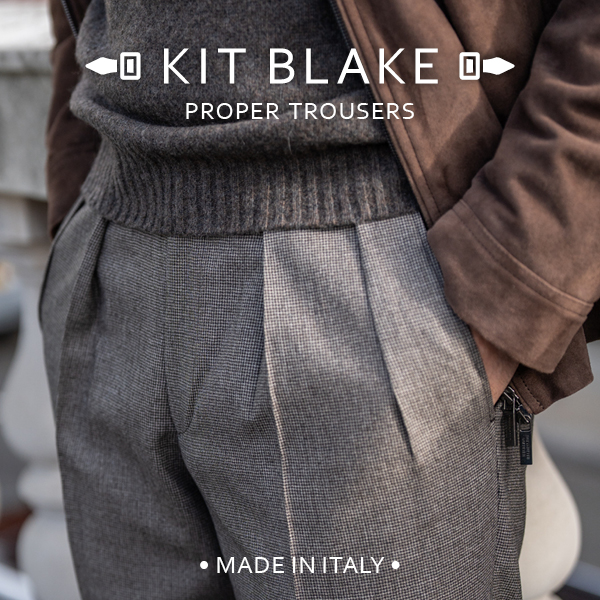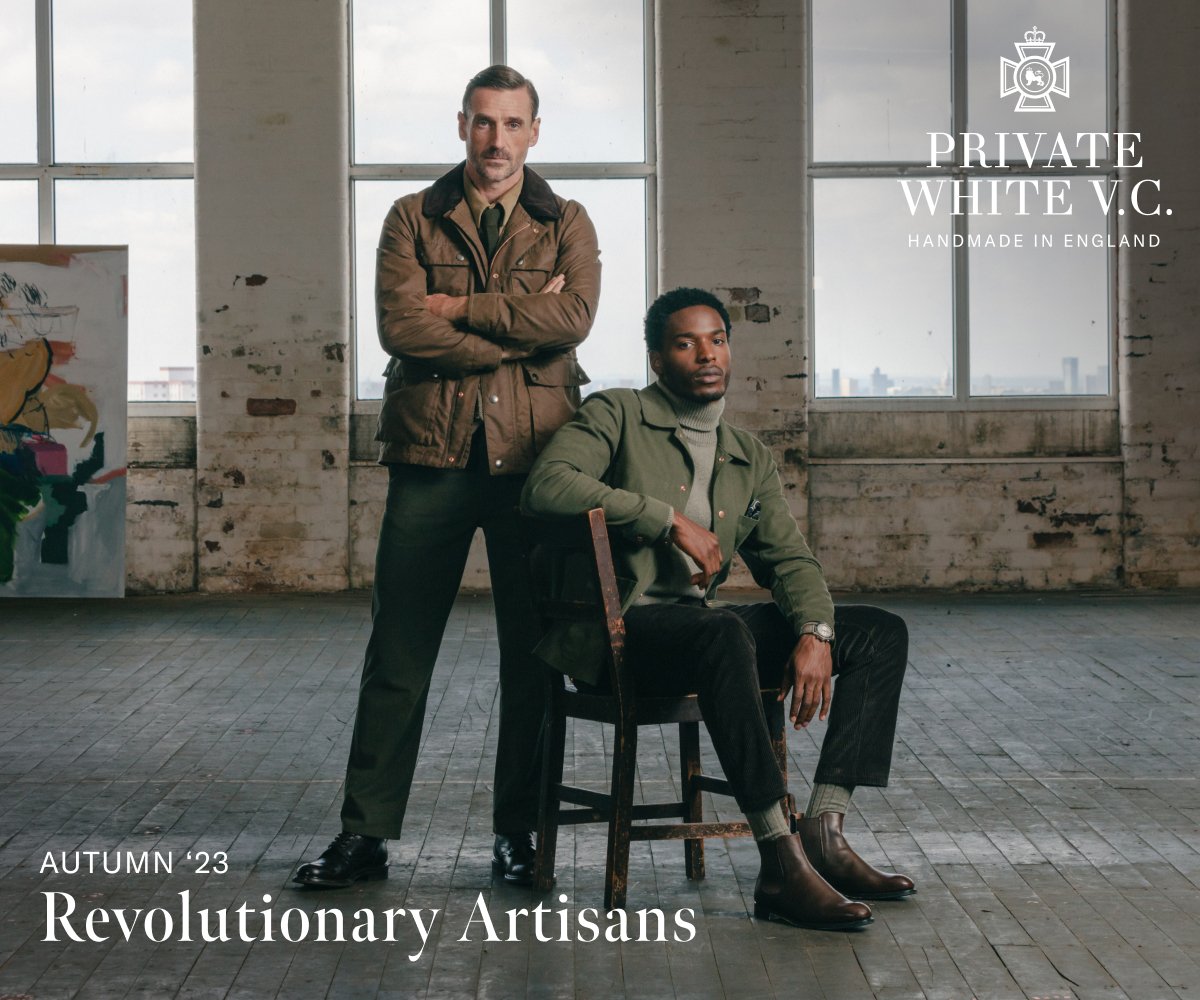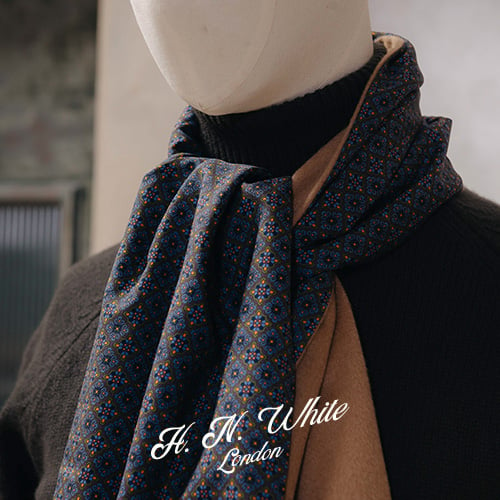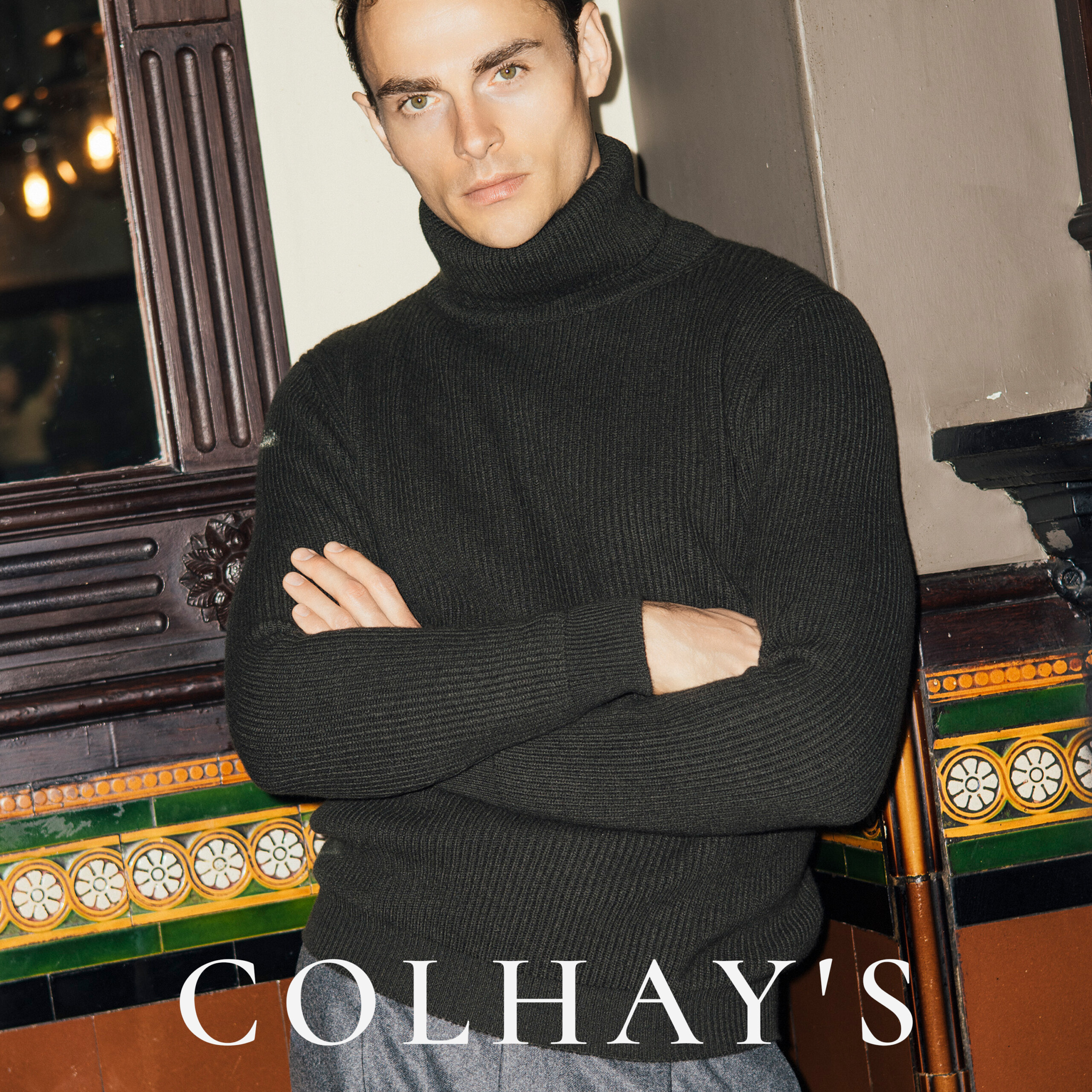The accidental columnist: A conversation with Robert Armstrong
 Robert Armstrong is the US Finance Editor at the Financial Times. He has also been their Chief Editorial Writer and edited the Lex column.
Robert Armstrong is the US Finance Editor at the Financial Times. He has also been their Chief Editorial Writer and edited the Lex column.
In the midst of all this international finance, he has also fallen into the role of FT menswear columnist. I’ve enjoyed his pieces for a while, and so took the opportunity recently to ask him about how he mixes the two roles. And why you should destroy any tie that someone notices.
Permanent Style: So Rob, how did you start writing the column?
Robert Armstrong: I guess it’s one of the virtues of working at an understaffed organisation. It was 2016, and Prince had just died. There was a panic at the FT that they needed some American to go on video, and talk about Prince. I happened to be the American sitting there, and I was a Prince fan, so they rolled me in front of the camera.
I started talking about how Prince was not just an important musician, but had a distinct position in style - his clothes, his hair, he was this phenomenal figure, analogous to David Bowie in a way.
The fashion editor at the time saw this video, and said ‘You know, I really need a column on menswear this week - you seem to have opinions on these things Armstrong, give me 600 words’.
And when you get a commission you write: so I wrote something. It went down OK, and thanks to Prince’s death I became a style writer.
I presume, as these things go at news organisations, it means more work but no more money?
Exactly - so it has to be something that’s fun. And I’ve always been very interested in menswear - this just gives me the format to express it.
Though sometimes I’ll get grouchy comments from colleagues, when they think I’m doing too much fashion writing, and not enough finance.
Do you see any overlaps between the two?
Yes, in fact I see the style writing as being about human behaviour - so it’s not that different to money, power or anything else.
Someone once said that philosophy was the art of making the simple complex, and the complex simple. There’s a lot of that in journalism, and in both menswear and finance.
Explaining a credit default swap can seem quite simple, but what’s underneath is complex. In the same way, a suit jacket can seem like the most simple, functional garment, but you and I both know how much wicked complexity there is in the structure.
What aspects of human behaviour do you like to explore?
Well, like any good columnist I have a number of key opinions that I like to elaborate on.
A friend once said that the key to frequent writing is to have four or five opinions to cycle through. And then every few months you think, ‘Jesus, I need a new opinion’, so you come up with a new one and swap out one of the old ones.
One of mine is that we’re always dressing up. Even if we decide to wear a T-shirt and sweatpants, that’s a decision we’ve made.
Human beings are animals that present themselves to the world. We show an image to others and tell a story, in how we cut our hair, how we stand, the words we choose.
When people say they just wear what’s comfortable, or don’t care what they wear, they’re not speaking the inner truth. We all care, we all present something, no matter what we wear.
Because the person that says they don’t care what they wear, wouldn’t go out in a tuxedo, or a clown suit.
Yes, and particularly in these casual times, people are quite annoyed by that idea. I get angry letters about it.
You can see that in the comments under the articles - people are always saying ‘I can’t believe I’m reading this rubbish in the FT’. They seem to have ignored the fact it says ‘Fashion’ at the top of the column. And it's a little odd they’ve read the whole article, despite it being rubbish, and taken the time to comment as well.
The fact that there's a class of people who get mad at the very suggestion that clothes are important, tells you something about how important clothes are.
Has your position in the office changed since you started the column? Do colleagues react to you differently?
I certainly get more comments about how I dress. If I’m ever sloppy, people take note.
Though as a features writer in general - and you’ll know this - you expose yourself to the world. It can be embarrassing. But that’s often what makes the best copy - people like you to put yourself out there.
Do other men find it annoying - that you’ve got a handle on this ‘clothes thing’ which they find frustrating?
Yes, I think there are two classes of men there (and again, I’m sure it’s something you find too). The first is the resentful one you describe; and then there’s another group, a smaller one, that is just relieved to find someone they can talk to. Someone that shares their secret vice.
Speaking of which, my interest in clothes came from my father, and an uncle on my mother’s side, who both dressed beautifully and took great pride in their clothes. They came from a generation when, for whatever reason, being a clothes horse was more common, and accepted.
Do you think that’s changed in the past 15 years - that it’s more acceptable now for a man to be interested in clothes?
Yes I think that’s right, it has changed. I hope it continues to do so.
Because it’s fun, that’s the bottom line. I don’t want to be bossy about how someone should dress (though I get accused of that). I just think it’s a fun way to express yourself.
And if men thought about clothes as much as women do, I think the world would be a more interesting place.
Interesting and enjoyable: that's what clothes should be.
Exactly.
Do you have to tailor your columns to the FT audience?
I think I do, yes, though it’s an FT Weekend audience, so it's a little different.
In general, I think I just try to amuse the editors. It can’t be boring - it’s 700 words on clothes, and it has to entertain someone as they're eating their toast on a Saturday morning.
Sometimes topics are just presented to you - a colleague came up to me the other week and said they’d witnessed a cravat in a Zoom meeting. That was enough for a piece.
What are your other four or five opinions?
Well, one theme is rebellion. How many of the style icons from the middle of the twentieth century - Steve McQueen, Miles Davis, Samuel Beckett - were rebels. Yet in clothes, for decades now, everything has been commoditised. Punk has been reprocessed so many times the original barely exists.
So how do you rebel today? How do you dress unconventionally, without selling out even harder than the conventional guys? That theme of pop culture eating itself is something I come back to.
One thing you write about a lot, Simon - and I don’t tend to, though I’d like to more - is how clothes are made. How there are all these little businesses out there making really nice things; and how can they possibly survive in this world?
A reader made a good comment about that recently. Someone referred derogatorily to the rich, private owners of some menswear companies - and the reader pointed out that patrons have always been how craft companies have survived. It’s most obvious in the arts, but it’s always happened with crafts as well.
I think you’re right, and personal connections are always such a strong driver for these companies.
I was lucky enough - while I was living in London - to have shirts made at Dege & Skinner, where my Dad had shirts 50 years ago. And they remembered him too.
It was so much fun. It makes you feel you’re part of something that’s not just a business, but a tradition.
Another one of my themes is how little colour men are able to wear - and what a bummer that is.
Women have more challenges than men in many ways, particularly in a professional context. They’re much more likely to be judged on what they wear, and how they present. But they at least have a larger palette.
Which is why it’s such a shame that men wear ties less these days.
Absolutely. When you had a tie, a shirt and a jacket to play with, you could do something interesting. That was fun, playing that game with your closet.
But you can’t do that if no one else is - it's a nuisance if you stand out. I like my clothes, but I don’t want to talk about them all day. I want to work.
I quoted Cliff Grodd in a past article, on that topic. He was a style God here in New York, when he was at Paul Stuart - in fact, people used to say ‘Grodd is in the details’.
Anyway, a friend of mine had a meeting with Grodd [below] once. My friend was interested in clothes, starting out in business, and knew Grodd through a connection. He asked if he could see Mr Grodd and ask his advice about clothes for work. So Grodd says yes, come to his office at 7am.
They meet, and among the things my friend remembers Grodd saying is: “What matters about a man is what he says, and what he thinks. And everything a man wears should direct the eye upwards, towards the face.”
Then he says: “So the worst thing you can do is wear a belt, particularly with a shiny belt buckle. How vulgar! You want me to look at your crotch?”
I thought that was great. And the second anecdote was related to standing out. He said: “If I’m out in town and someone says to me ‘nice tie’, I thank them very much for the compliment, I go home, take a pair of scissors, and I cut the tie in half.”
Because the tie has distracted from the person. Now I don’t take that attitude, I love a compliment about what I’m wearing. But it stays with you.
In general, I think today men can get a little stuck about clothes, which is a shame. So I try to rebel a little bit now and then, in what I write. And - if I’m feeling courageous - in what I wear.
A great sentiment to end on. Thanks for your time Rob.
My pleasure Simon. Nice to be interviewed rather than the other way round for a change.
Below is a selection of some of Rob’s favourite articles, and his comments. The FT has a paywall, so you will need to take a trial to read them, if you're not already a subscriber.
- A lament on the conformity of male dress
- On jeans & jackets ("someone actually sent me a picture of you in riposte to this one")
- A tribute to the style of 'the Dude'
- On Trump’s and Boris's clothes, which also contains those Clifford Grodd anecdotes. ("FYI, this is Grodd's obit which will amuse you. Last line nails it. Boy I wish I'd met him")
- On corduroy ("I had a corduroy suit made in the end, in London, and I love it")
































Really nice interview Simon, you get a real feel for the man from that. Will definitely check out his column.
What a great interview.
Clearly the thinking man’s flaneur.
I have this theory. The better the music & cinema, the better the style. It’s why the ‘60s and ‘70s were so prolific. The music and movies were phenomenal and synergistically, that drove the style.
Nice interview Simon. I think that it’s important to differentiate between having rich owners and having rich patrons. Enjoying the way your tailor cuts a suit or makes a shirt is a reason to buy more suits and shirts – not a reason to buy the company. Having rich patrons on the other hand is just sensible if you run a menswear store in London – everyone needs customers!
True. I guess sometimes a patron can mean more though as well – eg a patron of the arts might also help raise money for an institution, give their time, become a member/subscriber. Support in other ways basically
I think we have to refuel our rockets back to earth on this one.
If rich patrons hadn’t bought their Savile Row tailors they simply wouldn’t exist today.
The lack of scalability coupled with the meteoric rise in rents would have seen to that .
Thank God for Tiny and Anda Rowland – they’ve kept my tailor going.
One of his recent columns – that made me laugh – was on “Dr Fauci the master of anti style”
https://www.ft.com/content/471500dc-7d8f-11ea-8fdb-7ec06edeef84
Bloody great interview, talking to Rob was a great idea. I’ve been an FT (Weekend Edition) subscriber forever and I really enjoy his articles. This has deepened my respect for Rob, and I especially agree with the point that we all care about how we dress – whether we admit it or not.
My only complaint? Pity you didn’t record it and make it available as a video.
Well done Simon.
Really enjoyable article. Reminded me of stylish fathers from my youth in 60s London and a piece of style advice from my own father: “never wear a tie that someone sees, before they see you”.
Also on the subject of Dr Fauci, there was an excellent article in the Sunday Times Magazine (June 14) about him, by Josh Glancy, who is always worth a read (we are not related!).
Clifford Grodd’s quote in the last line of his New Times obit may very well be the most significant insight in the history of men’s clothing.
Which was, for those that haven’t clicked through:
“I abhor dullness and resist flamboyance,” Mr. Grodd told The New York Times in 1985. “That’s a hard line to walk — to be distinctive, subtle, disciplined, with a sense of humor.”
Really enjoyed reading that !
Certainly gives me more references for other writers in your field.
Simon, would be great to learn more about Clifford Grodd .
On clothes and men it certainly must be said they have a huge impact on not only how men come across but how they behave.
One only needs to see the ugly scenes in London last weekend to understand this .
Great interview! That is all.
Really a GREAT article. Your excellent website reaches quite widely but, I would aver, more towards people who are already fairly interested in dressing well. It’s great that we can also have fellows like Armstrong that can evangelise the less (currently) committed ones.
As a regular reader of Robert’s columns, both in the main paper and the Weekend section, I was slightly perturbed by the thumbnail picture of this article from the PS weekly newsletter. Until I’d read the piece and understood the context of the picture I was worried that his FT byline photo was out of date by about 30 years!
I find the notion that we are all presenting something really comforting. As someone that’s been called out of the office for not aligning to a software (t-shirts that are clean considered formal) culture by wearing a blazer, I find this really comforting. It gives me another retort, rather than the self-deprecation I instinctively lean towards to downplay my more formal style.
Simon, my congratulations. One of the most charming interviews I’ve ever read. And Robert Armstrong’s statement, “The fact that there’s a class of people who get mad at the very suggestion that clothes are important, tells you something about how important clothes are,” deserves to be in The Oxford Dictionary of Quotations. Following along that line, I’m including something that I think you and your readers will enjoy, though you probably know it already. (The quote is somewhat lengthy, so please feel free to cut as you see fit.)
In a letter to his son from November 1745, Lord Chesterfield wrote:
“Do everything you do well. There is no one thing so trifling, but which (if it is to be done at all) ought to be done well. … For instance, dress is a very foolish thing; and yet it is a very foolish thing for a man not to be well dressed, according to his rank and way of life; and it is so far from being a disparagement to any man’s understanding, that it is rather a proof of it, to be as well dressed as those whom he lives with: the difference in this case, between a man of sense and a fop is, that the fop values himself upon his dress; and the man of sense laughs at it, at the same time that he knows he must not neglect it. There are a thousand foolish customs of this kind, which not being criminal must be complied with, and even cheerfully, by men of sense. Diogenes the Cynic was a wise man for despising them; but a fool for showing it. Be wiser than other people, if you can; but do not tell them so.”
Wonderful, don’t you think? Just like your interview.
Absolutely. Thanks so much John
I’m starting as a journalist at one of England’s top newspapers this summer, do you think I’m overdressed if I wear a suit? I don’t like the jacket trousers combo
I really don’t know Matt – it depends entirely on the particular office. But I would say that you can’t go wrong with turning up in a good navy suit, probably (sadly) without a tie. Then work out what everyone else is wearing – as a new starter you want to be professional but not stand out at all with your clothes.